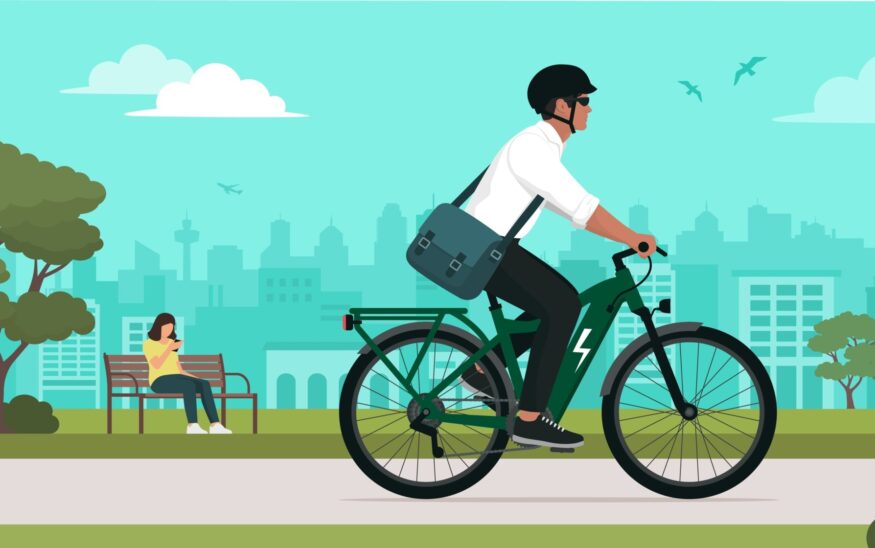How E-Bikes Will Transform the Transportation Economy in Colorado in 2024
Colorado is in the midst of is a massive evolution in transportation, and it's coming at e-lectricfying speed.
Jeff Rundles //December 11, 2023//


How E-Bikes Will Transform the Transportation Economy in Colorado in 2024
Colorado is in the midst of is a massive evolution in transportation, and it's coming at e-lectricfying speed.
Jeff Rundles //December 11, 2023//
All of a sudden, just this year — just the last few months really — everywhere I go I see and hear about electric bikes. E-bikes are the new fad, rolling into popularity as fast as their pedal-assisted electric motors will drive them. Among my circle of friends and acquaintances, they are the hottest new commodity on the planet.
Now, admittedly, at my age, 71, my circle is composed of a lot of people in the Social Security and Medicare set, so if you think about it, it makes sense that they would be embracing e-bikes. After all, e-biking is a form of assisted living.
But there is much more going on here than merely motorizing an age-old recreational transportation mode. What we are in the midst of is a massive transformation of transportation, one coming at e-lectricfying speed.
READ: Skyhook Solar — Solar-powered Charging Stations for E-bikes and Electric Cars
In a way, it reminds me of the introduction 20 years ago or so of light rail as a commuter option. The great thing about the light rail system built by the Regional Transportation District — one that continues to grow in spite of RTD’s many dysfunctional aspects — is that light rail appealed to and garnered (garners) riders who never in a million years would take a bus. I am among that crowd, in that a bus to me seemed so old-school, seedy and down-scale, but light rail feels sophisticated and modern.
It’s the same with e-bikes. I firmly believe that e-bikes will garner riders from a large group of people who would never in a million years ride a bike to work, but will probably start commuting on their e-bikes regularly.
The city of Denver in particular, and many other locales across the state and the country as well, have been building bike lanes and pushing biking as a form of commuting and mobility for some time now, often at the expense of traffic street lanes once reserved for automobiles and parking. Indeed, there is a national Bike to Work Week and Bike to Work Day (May 15-21 and May 19, respectively, in 2023), a national movement for “safer streets, connected communities, a healthier planet and happier people,” according to the League of American Bicyclists. That, I believe, will soon become an anachronism, as biking and e-biking especially become the norm.
Consider that, according to Fortune magazine, the global e-bike market in 2022 was something like $37.5 billion, with growth projections for that number to rise to $43.3 billion this year and to a whopping $120 billion by 2030. This has obviously gone way beyond recreational purchases and into the realm of primary transportation.
For Colorado this has come at a fortunate time, in that just this past August, due to the passage of SB22-193, Colorado launched a statewide e-bike rebate available to low- and moderate-income Coloradans where e-bike purchasers can get rebates of up to $1,750 for e-bikes and accessories (helmets) through the Colorado Energy Office. It’s a relatively complicated process, but it’s clear that the state — and many other locales around the country — are very interested in getting people on e-bikes.
We are, of course, in the midst of an “e” revolution in all vehicles; every automobile company on the planet is going electric very rapidly. But with cars, the purpose is essentially environmental — to supplant the use of fossil fuels — because an electric car doesn’t necessarily represent a new transportation mode, just a greener alternative. E-bike popularity, on the other hand, is not driven by environmental concerns, and is part of a seismic shift in mobility, one that will take many cars off the streets and get people pedaling for commuting and basic transportation.
READ: Becoming a Zero-Emissions State — How Alternative Fuels Are Transforming Transportation in Colorado
One of the most interesting things about e-bikes, to me at least, is that they are not very new at all. The first patent for an electric bicycle was granted to Ogden Bolten Jr. in 1895, with another patent awarded for a novel variation two years later. But then there were electric cars back then too; we humans need new reasons to recycle old ideas, I guess. Or perhaps it just takes time for us to come to our senses.
Either way, I feel it in my bones: Electric bicycles are about to take over the world.
 Jeff Rundles is a former editor of ColoradoBiz and a regular columnist. Read this and Rundles’ blog, Executive Wheels, at cobizmag.com or email him at [email protected].
Jeff Rundles is a former editor of ColoradoBiz and a regular columnist. Read this and Rundles’ blog, Executive Wheels, at cobizmag.com or email him at [email protected].
























